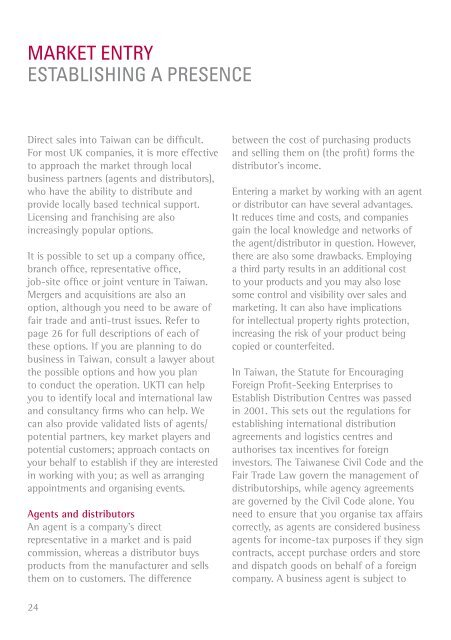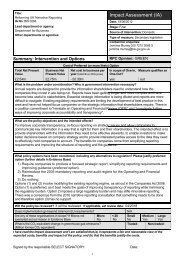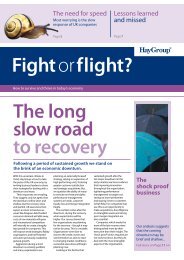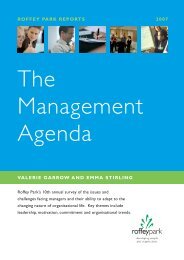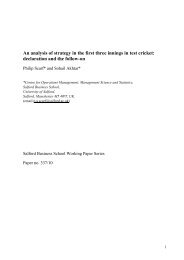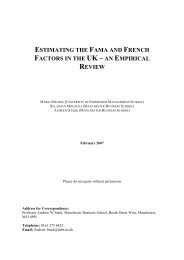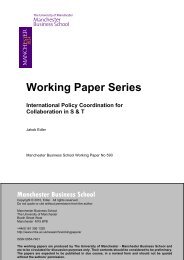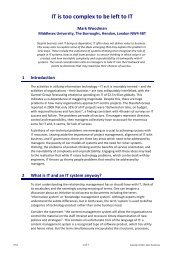Taiwan Business Guide - Management and Business Studies Portal
Taiwan Business Guide - Management and Business Studies Portal
Taiwan Business Guide - Management and Business Studies Portal
You also want an ePaper? Increase the reach of your titles
YUMPU automatically turns print PDFs into web optimized ePapers that Google loves.
Market Entry<br />
Establishing a presence<br />
Direct sales into <strong>Taiwan</strong> can be difficult.<br />
For most UK companies, it is more effective<br />
to approach the market through local<br />
business partners (agents <strong>and</strong> distributors),<br />
who have the ability to distribute <strong>and</strong><br />
provide locally based technical support.<br />
Licensing <strong>and</strong> franchising are also<br />
increasingly popular options.<br />
It is possible to set up a company office,<br />
branch office, representative office,<br />
job‐site office or joint venture in <strong>Taiwan</strong>.<br />
Mergers <strong>and</strong> acquisitions are also an<br />
option, although you need to be aware of<br />
fair trade <strong>and</strong> anti-trust issues. Refer to<br />
page 26 for full descriptions of each of<br />
these options. If you are planning to do<br />
business in <strong>Taiwan</strong>, consult a lawyer about<br />
the possible options <strong>and</strong> how you plan<br />
to conduct the operation. UKTI can help<br />
you to identify local <strong>and</strong> international law<br />
<strong>and</strong> consultancy firms who can help. We<br />
can also provide validated lists of agents/<br />
potential partners, key market players <strong>and</strong><br />
potential customers; approach contacts on<br />
your behalf to establish if they are interested<br />
in working with you; as well as arranging<br />
appointments <strong>and</strong> organising events.<br />
Agents <strong>and</strong> distributors<br />
An agent is a company’s direct<br />
representative in a market <strong>and</strong> is paid<br />
commission, whereas a distributor buys<br />
products from the manufacturer <strong>and</strong> sells<br />
them on to customers. The difference<br />
between the cost of purchasing products<br />
<strong>and</strong> selling them on (the profit) forms the<br />
distributor’s income.<br />
Entering a market by working with an agent<br />
or distributor can have several advantages.<br />
It reduces time <strong>and</strong> costs, <strong>and</strong> companies<br />
gain the local knowledge <strong>and</strong> networks of<br />
the agent/distributor in question. However,<br />
there are also some drawbacks. Employing<br />
a third party results in an additional cost<br />
to your products <strong>and</strong> you may also lose<br />
some control <strong>and</strong> visibility over sales <strong>and</strong><br />
marketing. It can also have implications<br />
for intellectual property rights protection,<br />
increasing the risk of your product being<br />
copied or counterfeited.<br />
In <strong>Taiwan</strong>, the Statute for Encouraging<br />
Foreign Profit-Seeking Enterprises to<br />
Establish Distribution Centres was passed<br />
in 2001. This sets out the regulations for<br />
establishing international distribution<br />
agreements <strong>and</strong> logistics centres <strong>and</strong><br />
authorises tax incentives for foreign<br />
investors. The <strong>Taiwan</strong>ese Civil Code <strong>and</strong> the<br />
Fair Trade Law govern the management of<br />
distributorships, while agency agreements<br />
are governed by the Civil Code alone. You<br />
need to ensure that you organise tax affairs<br />
correctly, as agents are considered business<br />
agents for income-tax purposes if they sign<br />
contracts, accept purchase orders <strong>and</strong> store<br />
<strong>and</strong> dispatch goods on behalf of a foreign<br />
company. A business agent is subject to<br />
24


